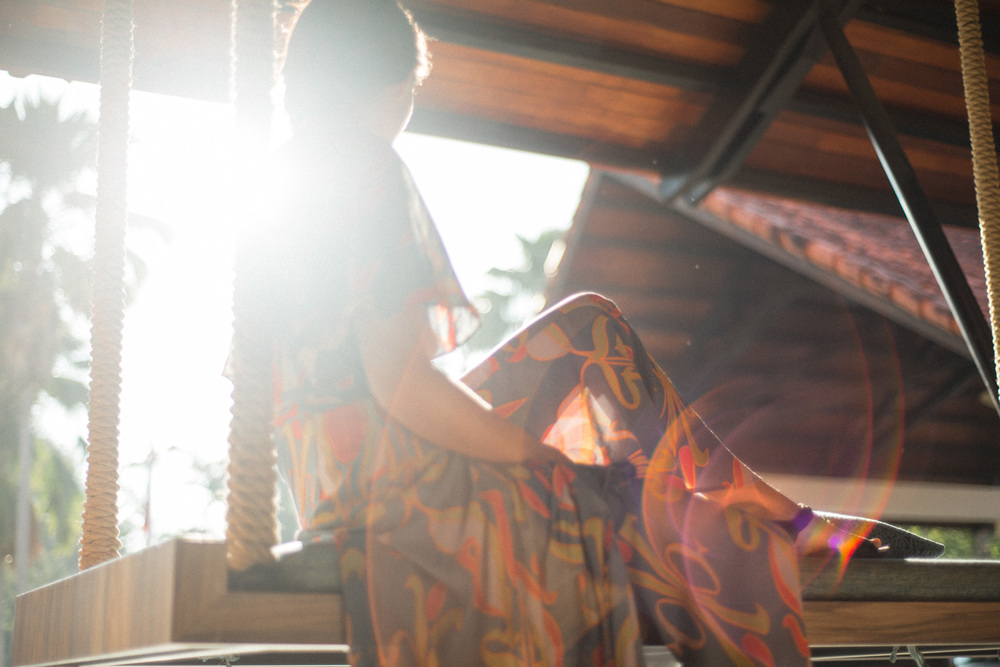
Navigating your way through any foreign country can be daunting and Indonesia is no exception. Here are a few quick tips to keep your travels safe, respectful and fun:
-
Dress modestly: Always a good rule of thumb, but be especially mindful as Indonesia is a predominately Muslim country and social norms are different than in the U.S. Try to remember that even though people may not directly say anything to you, culturally it could be making those around you feel uncomfortable. To err on the safe side and have more genuine and comfortable interactions with local people, try to keep your torso covered even when on the beach or at public swimming areas. In general, shoulder to knees is a good rule. I brought a lightweight kimono style top with loose long sleeves that I wore over most tops or dresses. It did double duty and also was extra protection against the sun and mosquitos.
-
Bring a sarong: There are many temples that require you to wear one (although you can rent one if you forget) and I found it is a very useful item to have for the beach or as a throw for over your shoulders. Sarongs also dry faster and in a place with 80-90% humidity this can mean the difference between a perpetually smelly, wet backpack or a dry one.
-
Monetary system: The rupiah to dollar conversion will leave you feeling like a millionaire – literally. The current exchange rate is 1.3 million rupiah to $100 USD. I like to remember it as 10,000 IDR is about $0.75 and 200,000 is $15. Most prices are quoted in thousands of rupiah so if a menu says 55 it usually means 55,000 IDR.
-
Negotiating rates: Coming from a non-negotiating society means this is definitely something I’m not an expert at. Here are some basic rates that we found to be fair when traveling.
-
Gas 1 liter – 10k
-
Scooter rental – 50 to 75k per day with helmets and returning it with the same amount of gas it started with
-
Hiring a driver – 450 to 650k depending on how far you need to go
-
Homestay – 200 to 250k per night for 2 people usually including breakfast
-
Bottled water – 5k, in restaurants up to 15k
-
If you are looking to save money homestays and eating local will be your two new best friends. Eating local means street vendors, eating where the locals eat, and choosing regional dishes like Mie Gorang (friend noodles), Nasi gorang (fried rice), etc. over things like club sandwiches, pasta, or burgers. On average we found it cost us at least 4 times more to eat “western” food meaning 50k IDR versus upwards of 200-250k for two of us when we didn’t eat local.
-
Homestays are the Air B&B of Indonesia. Since we visited in the very beginning of the dry season (April) finding rooms wasn’t too difficult. In the busy summer season, leaving accomodations to the last moment isn’t as advisable. From my experience the rooms were always sparse, but clean. Some don’t have hot water and most have squat style toilets not western ones. We got to meet some really kind and knowledgable people through staying at so many properties. From the mountainsides to ocean front, homestays are everywhere and they are awesome so don’t be afraid to walk in and ask if they have room!
-
Pay for luggage online. Many low-cost carriers who operate in the area charge different rates if you buy your luggage at the airport or purchase it beforehand. In one instance I paid $160 one way for my backpack when I could have paid $30 if I did it earlier.
-
Malaria and the dreaded mosquitos. Make sure to cover your arms and legs especially at dawn and dusk. Although I brought oral daily malaria pills with me I ended up deciding not to take them. This is a heavily debated topic and do your own research for the areas you will be in and the levels of risk you are willing to accept. I did opt to get my Hepatitis A shot and Typhoid as those are highly effective with little to no side effects.
comments +